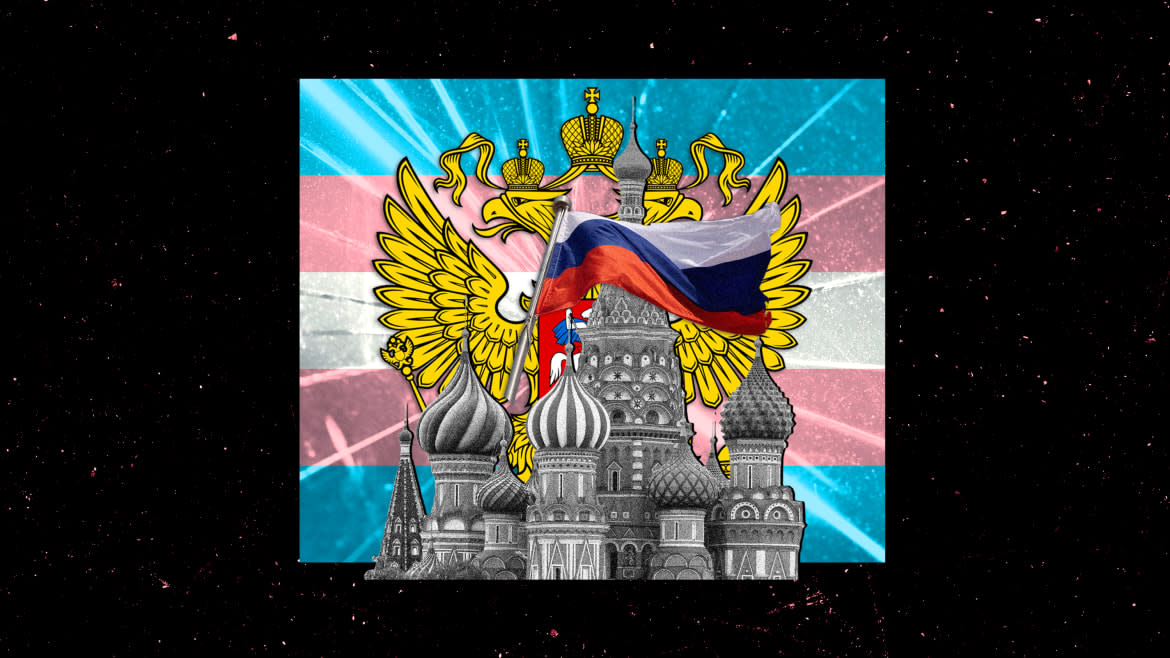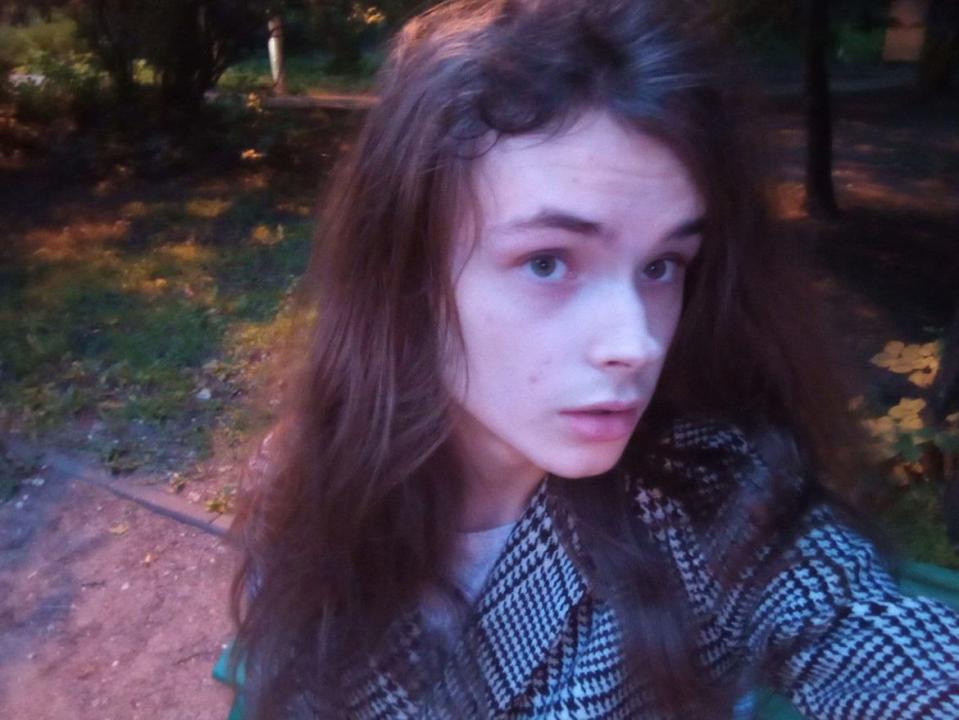Trans Russians Fear for Their Lives After Surgery Ban Passed

- Oops!Something went wrong.Please try again later.
When the lower chamber of the Russian parliament passed a new law banning gender-affirming surgery for transgender people, it confirmed Milana Romanova’s worst fear: The relative freedom that transgender people had enjoyed in Russia since 1997, during her entire life, was over.
The new law—passed Friday, and which now goes to the upper chamber and President Putin for final approval—hinted dangerously of increasing medical pressure on gay and transgender people: Putin had personally ordered the ministry of health to create a special “psychiatric institute” to study LGBTQ people. Romanova told The Daily Beast that the new legislation “would only encourage more violence and more transgender people will attempt to commit suicide.”
LGBT, Terrified for Their Lives in Russia, and Desperate for Asylum
An 18-year-old stylist, Romanova was in the process of transition. The law means she will not be allowed to have any further medical help, legally. She now walks on the streets of Moscow, “feeling herself as a Jew in Berlin during the World War II,” she told The Daily Beast. “This law is an invitation to kill us all, there is only one way to survive—to leave the country; I wish I had money to travel to one of the most transgender-friendly countries like the Netherlands,” she said. “Western countries should make the immigration procedure easier for Russian transgender people—we are the most vulnerable group here. The discrimination we face threatens our lives.”
A few months ago, Romanova began to take female hormone therapy and her voice changed. “As soon as I heard back in May, that the State Duma deputies were proposing to ban transition, I rushed to receive a medical diagnose of ‘transsexuality’ and managed to change my passport,” she told The Daily Beast.
Until recently, Russians wishing to legally change their gender had to interact with psychiatrists, municipal authorities, draft officers and sometimes judges. But there was a legal route to transition. On Monday, Russian transgender people’s closed chat on Telegram for over 1,000 Russian trans people was bubbling with updates on which psychiatrist to run to get the most-desirable F-64 certificate, a diagnose of “transsexualism.” Then, based on that certificate, one could get a passport changed.
But there is no time left. Transgender people have less than one week left before Putin signs the law. “I have no doubt he will—this is Russia, and then none of us will have any access to professional medical help and society will know it’s OK to eliminate us,” Romanova told The Daily Beast.
International groups condemned both the bans of the gender-affirming care and the elimination of legal recognition of transitioning between genders in Russia.
“This is a part of an ideology aimed at erasing trans people, and this is true in the US as well as Russia. This is also the same kind of ideology that also drives the anti-LGBTQ legislation and bills in Uganda and other countries in Africa,” Maria Sjödin, executive director of Outright International, told The Daily Beast. “Governments are claiming to protect ‘youth’ or ‘traditional families,’ while ignoring the fact that gender-affirming care and legal gender recognition that respect people’s identities save lives and improve the quality of life immensely for trans people that have access to them.”

Milana Romanova.
LGBTQ people’s persecution, discrimination, and fight for equality have been political issues in Russia ever since Stalin’s crackdown on gay men in the mid-1930s. Russian gay men were arrested and sentenced to 5 years of prison in USSR, punished by criminal law for nearly seven decades until post-Perestroika reforms, after which international gay and lesbian symposiums, film festivals became popular. Homosexual acts between consenting adults were legalized on May 27, 1993.
But by 2011, Vladimir Putin’s government pivoted to repression of LGBTQ people as a political strategy, seen as distracting from failed economic reforms. His model of government was not going to make Russia more prosperous than the European Union, so the Kremlin started to define the value of Russian leadership as opposing Western decadence.
The Pussy Riot trial became a long show trial of the anti-Putin punk band that was supportive of LGBTQ rights. The Kremlin’s propagandists condemned the decadent West for accepting transgender people, and presented Putin’s government as a defense of traditional values. Of course, many in Putin’s circle cheated on their wives and husbands, took bribes, stole from the state budget, and not all of this could be hidden. But their anti-LGBTQ stand defined them as different from Europe—and was politically useful.
In 2013 Putin signed the so-called anti-gay propaganda law, “for the purpose of protecting children from information advocating a denial of traditional family values.”
Nikita Loyk, an out-gay man from the Altai Mountain region in Siberia, has been documenting voices of the victims of LGBTQ repression. His recent film Incurable Me about horrific cases of Russian conversion therapy, recently premiered in Lisbon and Amsterdam.
“The new law obliges every district clinic to hire a sexologist and treat teens; this law is a carte blanche for violence, and a license to kill for all sorts of thugs,” Loyk told The Daily Beast. “After I released my film, I received many letters from LGBTQ people in Russia. One guy said: help me, they kidnapped my boyfriend and took him for conversion therapy. First, domestic violence was decriminalized in Russia and now nobody seems to care if transgender people will survive.”
In post-Soviet countries with authoritarian regimes parents often took their teenage transgender children for repressive “treatments” at mental clinics or religious institutions. One of those featured in Loyk’s documentary, a transgender man named Dr. Zeyd, was sent to Iran by his mother when he was 19 years old.
Sexual activity between members of the same sex is illegal in Iran (indeed punishable by death), and Zeyd was sent for religious correction. “It was all useless; I had felt myself a boy for as long as I remembered myself, so even during the special corrective prayers I caught myself thinking that I like done of the girls in our group,” Dr. Zeyd, now a stomatologist in Amsterdam, told The Daily Beast. “It is extremely dangerous to deprive people in transition of medical help. Hormones can be damaging for health if one takes them without doctor’s prescription. Even in Iran, if one feels himself a woman, the state helps you to transition and provide medical service. The law is not going to stop Russian transgender people. But without medical aid, their health might be ruined.”
Even before the new law, Russian transgender people have been victims of violence. A group of thugs attacked two young transgender people, Melody and her friend, when they walked home in the city of Yekaterinburg in 2016. “They beat us terribly. I still have a scar on my face, but my friend had many more scars; a few days later she walked out of the window on the 16th floor,” Melody, who now lives in the Netherlands, told The Daily Beast.

Melody.
Attacks, humiliations, and her friend’s tragic death made Melody scared and depressed. “I thought I would have to cope with ‘normality,’ stop the transition—but no laws, no pressure could break my nature. I knew I could only be happy as the woman I am.”
Melody and her mother moved from Yekaterinburg to the Tula region. By 2022 Melody was living with her boyfriend there, terrified by the war in Ukraine, by the draft, and by the increasing repressions on LGBTQ people.
“Last December we made a decision that I move to Amsterdam and he would join me later. But upon my arrival in Holland I received a phone call: my boyfriend was stabbed to death in the town of Aleksin,” she said. Of Russia, she said, “I look back and see only repressions, fear and threats.”
Get the Daily Beast's biggest scoops and scandals delivered right to your inbox. Sign up now.
Stay informed and gain unlimited access to the Daily Beast's unmatched reporting. Subscribe now.

